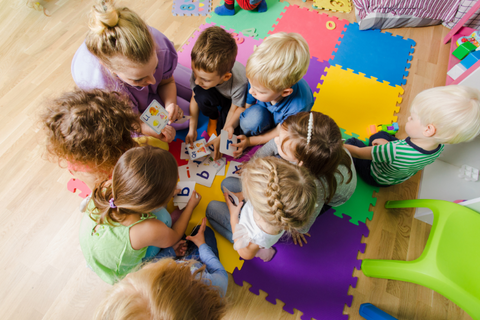Guest Post by Katy Fleming, MA, LPC, BSN, RN
Our kids pick up many things from daycare such as new friends, phrases, and unfortunately, germs.
It’s getting colder, which means cold and flu season has arrived in full force.
Learn how to minimize the spread of viruses and bacteria at daycare with these proven strategies.

5 Ways To Make Daycare Less Germy
According to the American Academy of Pediatrics, infants in childcare suffer from 10-12 upper respiratory infections a year on average. The number drops to approximately 4 per year for older children.
We certainly can’t eliminate illness– at some point, your little one is bound to get sick.
However, these research-based tips improve the overall well-being of your child and minimize the spread of germs.
1. Hand Washing
Preventing the spread of germs starts with basic hand-washing.
Teach your little ones at an early age how to properly wash their hands. The Centers for Disease Control and Prevention (CDC) identifies hand washing as one of the most effective ways to prevent illness.
Our kids don’t always take the time to scrub their hands fully. Education and practice are needed to instill healthy habits in our children.
Follow these simple instructions:
- Wet your hands with warm or cold water
- Lather soap on your hands by rubbing them together. Don’t forget in between your fingers, under your nails, and the back of your hand.
- Scrub your hands while singing the “Happy Birthday” song twice (aka 20 seconds long).
- Rinse your hands under clean water.
- Dry your hands with an air dryer or clean towel.
Studies show warm water isn't more effective in getting rid of germs than cold water. So use whichever your kiddo prefers!
Another interesting fact: wet hands transfer germs more easily than dry ones. So don’t forget to practice drying off!
2. Allow Space
Germs spread in many different ways including through sneezing and coughing droplets.
Research identifies a connection between the amount of space in daycares and the rate of respiratory infections. So if you have a smaller area packed with children, then there is a higher probability of spreading germs.
When choosing your child’s daycare, consider the square footage and overall space available in comparison to the number of children present each day.

3. Stay Up-To-Date On Vaccinations
In addition to hand washing, vaccination remains one of the most effective ways to protect your child from childhood illnesses.
Be sure to discuss the vaccination policy with the daycare, as well. Everyone needs to remain updated on their vaccinations including children and staff.
Check out the CDC website for the 2023 recommended vaccination schedule.
A new RSV vaccine was approved in July 2023 and it’s strongly recommended for babies 8 months and younger. Respiratory syncytial virus, or RSV, is a very common respiratory virus that can cause severe infections in infants.
Thousands of children with RSV are hospitalized each year. Vaccines help your child’s immune system identify and destroy germs.
Prevent infections by keeping up with your little one’s shots.
4. Set Healthy Habits
Encourage a healthy lifestyle for your kiddos with these everyday habits.
- Sleep is vital for growth and development in your child. Minimize screen time at night and develop a bedtime routine to encourage sufficient sleep.
Check the American Academy of Pediatrics for recommended hours of sleep.
- Provide a balanced, healthy diet including fruits, vegetables, and other nutrients to boost their immune system.
- Teach your child how to properly cover a cough or sneeze by either coughing into their shirt or their elbow.
Review when your child needs to wash their hands such as before and after meals, after sneezing, and after using the bathroom.
5. Review Daycare Policies
Ask important questions when choosing a daycare to prevent exposure to germs.
For example, identify what happens when a child shows signs of illness at the daycare. Some facilities have a sick room for kids waiting for pick-up when ill.
Separating children when someone has a virus greatly reduces the spread. Additionally, review the cleaning and disinfecting policy for not only the daycare but also the toys.
- What To Do If Your Child Is Afraid of Needles
- 5 Surprising RSV Facts for Parents
- Why Do Kids Always Go to the School Nurse
- How to Survive a Sleep Regression: What Every Parent Should Know
- 5 Things to Know About Nasal Hygiene

Children learn to play together and share their toys in daycare. When it comes to germs, though, sharing is not caring.
Promote a healthy lifestyle and minimize the spread of viruses at daycare with these tips.
If you have any questions or concerns, talk to your pediatrician for further information.
As a licensed counselor and registered nurse, Katy approaches freelance writing with years of experience and a unique perspective. Alongside her partner, Katy loves to travel the world and embrace other cultures from volcanoes in Iceland to villages in India.
The Nozebot is a battery-powered suction device designed to clear nasal congestion in babies and children.



